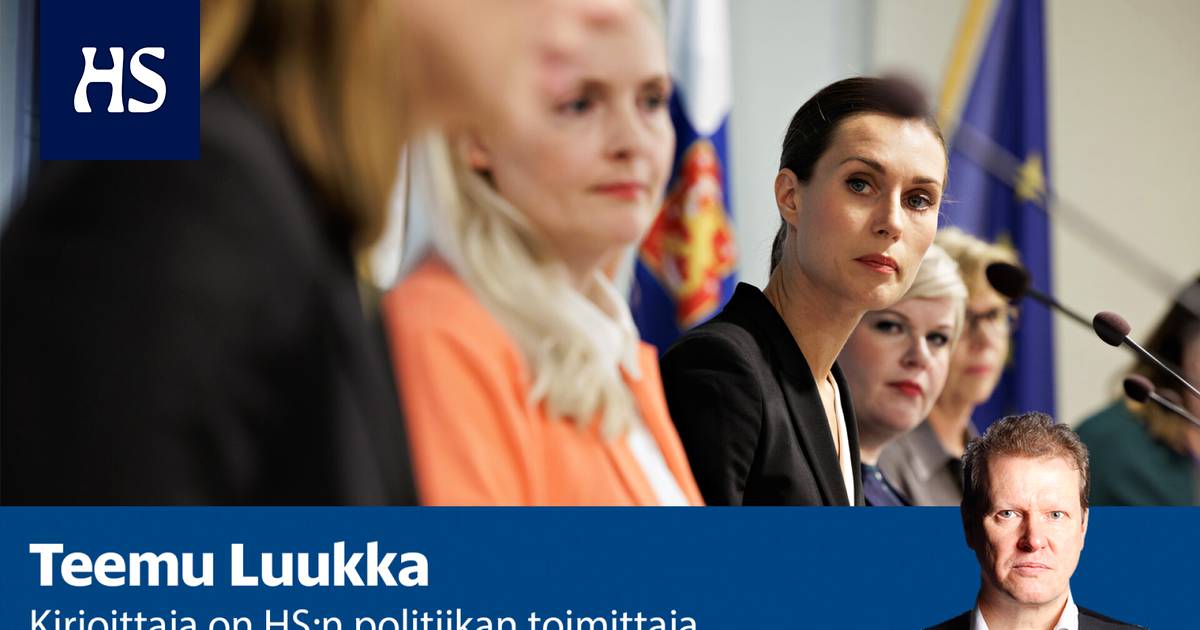The government’s last budget is once again a debt-increasing crisis budget, writes HS’s political reporter Teemu Luukka.
Prime minister Sanna Marini (sd) on Thursday, the government published preliminary information on how the state will use the money it collects from citizens and companies next year.
The release of the budget information was preceded by a so-called budget tussle that lasted a couple of days, where most of the time was spent on negotiations to agree on measures to mitigate the rise in prices, especially electricity.
The electric package has three decisions above the others. The value added tax on electricity will be reduced by 14 percentage points to ten percent for December–April.
In particular, the center and civil servants pushed for a decrease in value added tax, because it is easy to implement. And what is most convenient, it does not affect the so-called state budget spending framework, which is the ceiling decided by the governing parties on how much spending is allowed to rise.
It is easy to reduce taxes without violating the framework, because they are not included in the framework, even though tax reductions often increase the government’s debt just as much as the expenditures included in the framework.
Value added tax the problem is that it poorly targets those who need help the most. According to the calculations, the wealthy and reasonably well-off receive a greater portion of the tax benefit in terms of money than the poor.
In the case of new contracts, the tax sale does not necessarily even count the electricity bill, so the value added tax does not really hit the right target, even though it is popular with many politicians, for example with the general public, probably because of the rather mysterious framework system.
Calculating the value added tax is a similar action to the additional monthly child benefit announced by the government. Both those in need of money and millionaires get support.
“
The government admits that there will certainly be abuses.
Value added tax due to inefficiency, the government developed two new and possibly more precisely targeted forms of support.
Another of them is a temporary tax deduction for income tax. It could be done under certain conditions based on the electricity bill. The reduction will probably include a deductible of several hundred euros, which means that you would only get it when the bill becomes quite large.
Those with low incomes, for whom the tax reduction would not help, could apply for money in the form of income support based on the increased electricity bill.
The costs of both to the state are estimated at around 300 million euros, but this is a rather rough estimate. The total value of the VAT and the two new subsidies is estimated to be around EUR 800 million.
Read more: Depressing, irresponsible: Economists criticized the government’s budget solutions
Final bill cannot even be known, because no one knows how many times the price of electricity will increase next winter.
The price of electricity may rise even more moderately than expected, if the EU can change the rules of the electricity market so that market prices are no longer based on the price of the most expensive energy, i.e. gas. In this case, less support may be needed.
The government did not provide any details about the conditions of the subsidies, so it is difficult to assess their importance for citizens.
In any case, they are intended for those for whom the electricity bill causes the most problems. The government admits that there will certainly be abuses.
Next spring, we may read news where rich but unemployed people have applied for support for their electricity bill from Kela.
Prime Minister Marin said that the subsidy could amount to hundreds of euros if the electricity bill of a low-income person multiplies.
The new ones the supports were piled up hastily in a few weeks. The opposition has scolded the government for not being prepared for the household electricity crisis. In this respect, the opposition is absolutely right.
Throughout the spring, Finland mainly talked about the gasoline crisis and NATO, but the electricity crisis didn’t come out of the box either.
The Treasury minister Annika Saarikko (kesk) said at a press conference on Thursday that the depth of next winter’s electricity crisis has only dawned in recent weeks.
However, according to HS’s information, the government has talked about preparing for problems in the electricity market already in the spring, but no innovative preparations have taken place.
Of course, the overall responsibility for the government’s activities rests with Prime Minister Sanna Marin, but preparation for problems in the electricity market has been the responsibility of Saarikko, who headed the preparedness ministerial working group, and the Minister of Economic Affairs To Mika Lintilä (center).
“
The central problem has been the reluctance of officials to start preparing or even innovating systems that do not exist.
of HS according to several official and political sources, the central problem has been the reluctance of officials to start preparing or even innovating systems that do not exist, even though they certainly knew that there could also be an electricity crisis ahead.
Now it seems to have happened that the politicians only gave official orders towards the end of the budget preparation.
The slowdown in itself is not a problem if the subsidies are completed before winter, but it puts, for example, Kela and the taxman in an unfair position. They have a short time to prepare for the situation. The earlier the new systems were prepared, the better they would have been.
Is it The last budget of Marini’s government, the so-called election budget, as the opposition barks according to its mission?
In that sense, it is that the government had no desire to find new cuts, even though the state debt is estimated to rise again next year by billions of euros. Of next year’s budget of around 80 billion euros, around 8.1 billion will be covered by debt.
The government responds to accusations that it is not sensible to cut in the current situation. It’s not quite that, but it’s always a question of value choices: someone thinks that balancing the state economy should have started now at the latest, someone else doesn’t.
Read more: Mortgage interest, payroll taxes, tobacco: HS calculators show the effects of the government’s decisions on your wallet
Very however, the proposal cannot be called a harsh election budget, because in addition to temporary electricity and purchasing power subsidies, very little has been baked into the budget on top of the Ministry of Finance’s basic proposal, perhaps around 300 million euros.
They consist of, among other things, increases in training costs in the health care sector, the capitalization of the Pharmaceutical Development Center, the increase in the price of bitumen for road pavements, and the allocation of police funds.
It is unlikely that you will get many votes with those additional investments.
Major part of the new expenses is due to the fact that due to the rise in prices, government expenses will automatically increase by 800 million euros. In addition, interest expenses will rise by a couple of hundred million euros more than the Ministry of Finance considered in the summer.
These would have been realized even if the government had not made any decisions during the budget crisis.
When Antti Rinne (sd) government started 2019, it had some kind of plan to balance the state economy.
The starting point was to create opportunities for growth and to finance expenses with an increase in employment. Marin’s government inherited Rinne’s government program, but the balancing plans have fallen apart mainly due to the coronavirus pandemic, the Russian war of aggression and the energy crisis.
Almost everywhere in Europe, the state’s debt burden has increased, in many countries more than in Finland.
Read more: The Confederation of Taxpayers praises the government’s support for electricity bill payers: “Citizens can do the rest themselves by saving”
Others however, the indebtedness of the countries is not a reason that the state’s indebtedness could not have been approached more seriously. In addition to the crisis money, Marin’s government has also spent money on items whose significance for Finland’s rise to equality can only be assessed in retrospect.
But this time there was also composure. According to HS data, even the Ministry of Finance was a little surprised at how little so-called election expenses are in the budget.
Of course, you can consider electricity subsidies and the addition of various subsidies that strengthen purchasing power as an election measure, but these decisions have been made or are likely to be made by all European countries, whether they have elections or not.
Read more: Riikka Purra and Petteri Orpo criticize the government’s borrowing
Read more: The reductions in early childhood education fees will come into effect in January
Read more: HSL is happy with the government’s actions: “It is a future benefit for the user”
#Analysis #debtincreasing #crisis #budget #Marins #government









